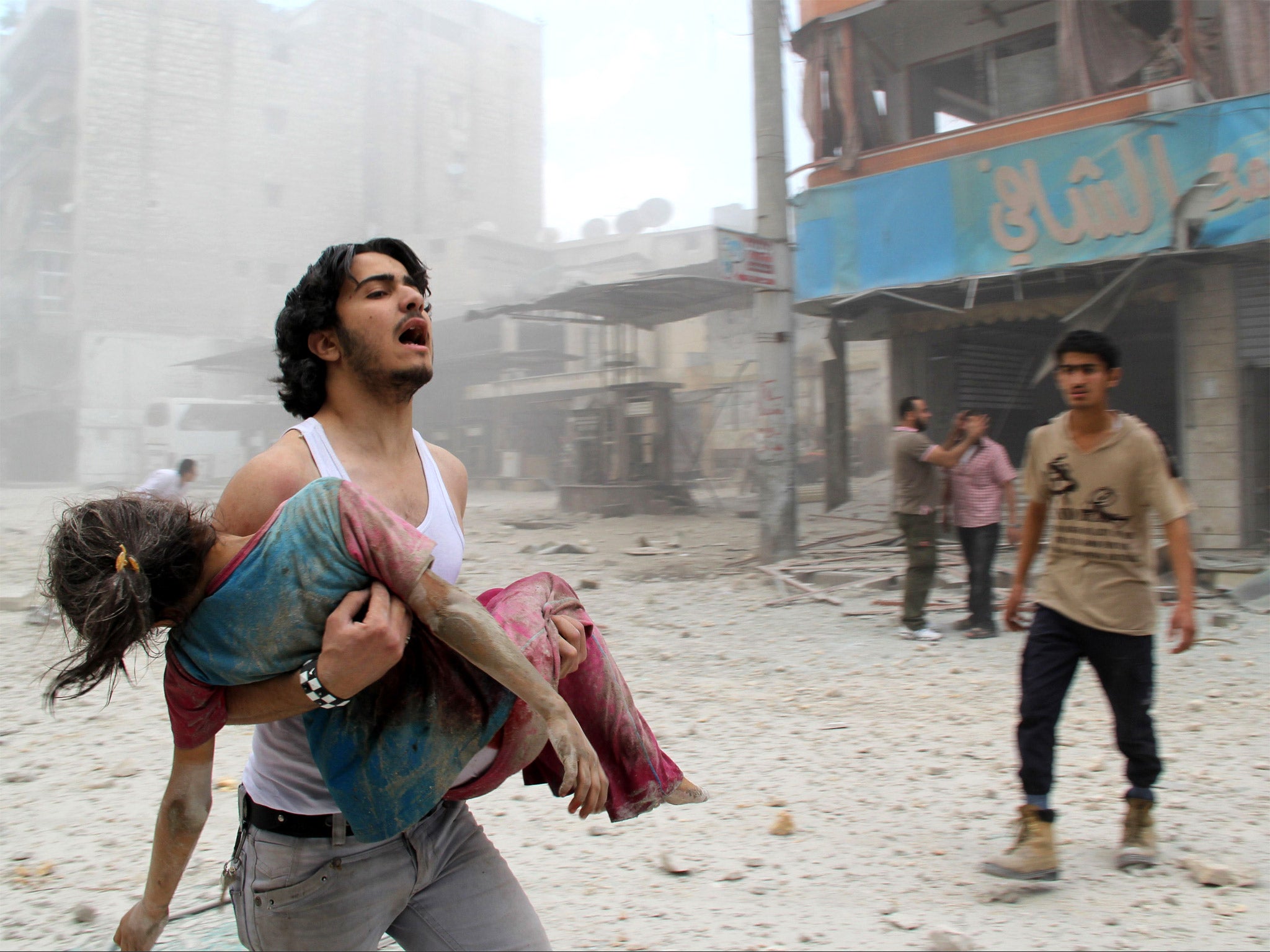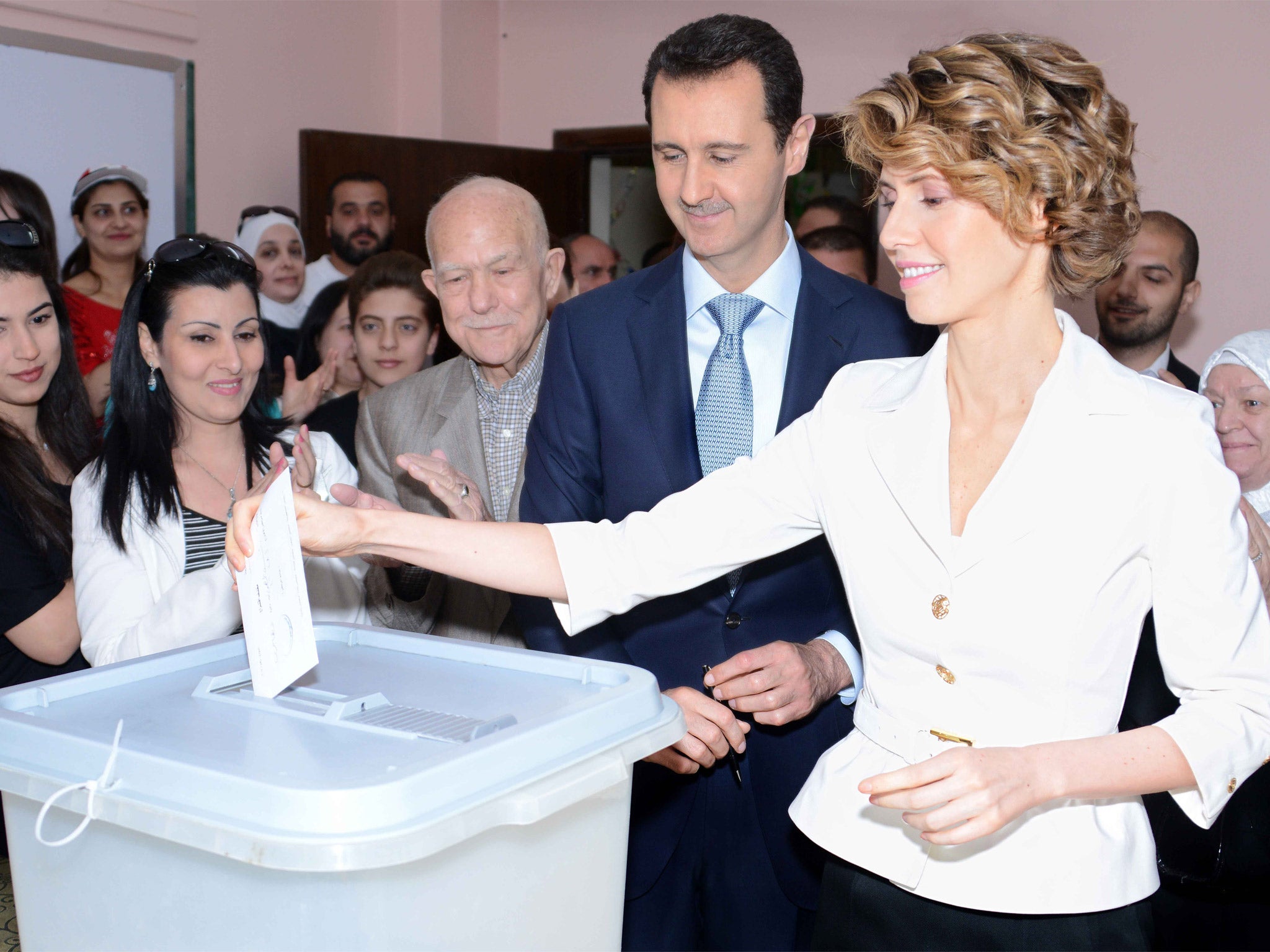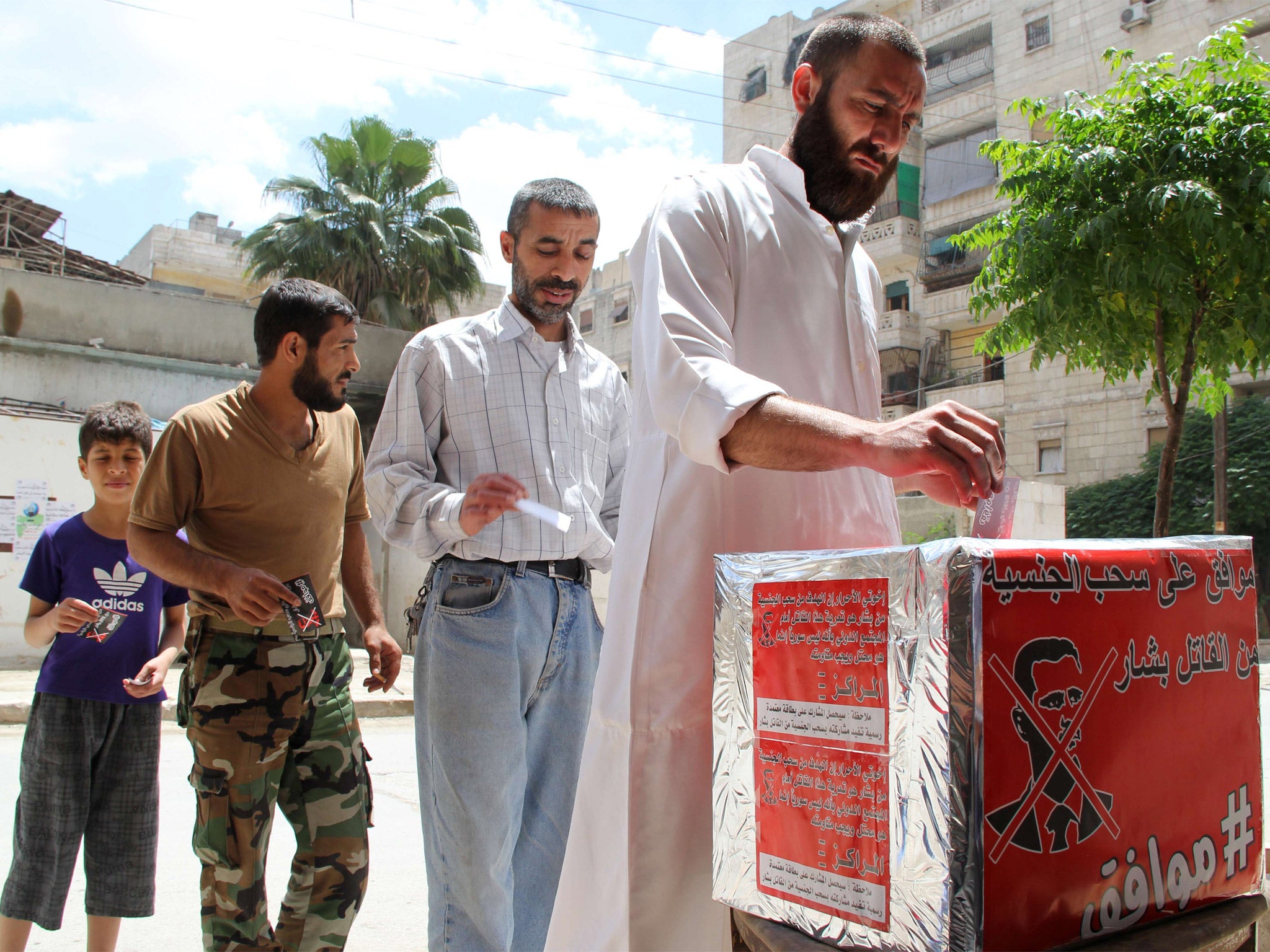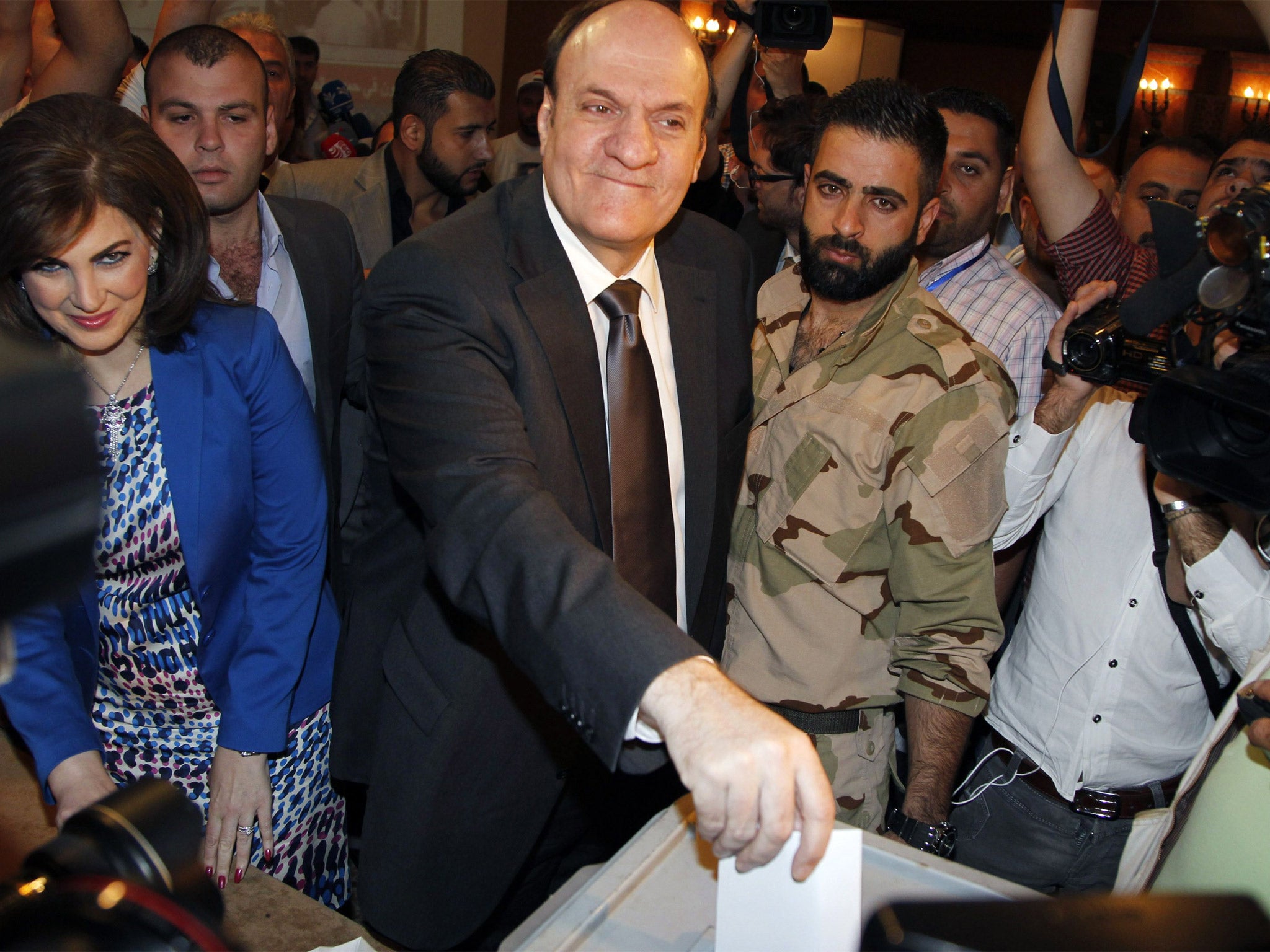Syria election: The barrel bomb and the ballot box - how Bashar al-Assad held on to power
Robert Fisk witnesses Assad's paper victory amid a bloody war

Your support helps us to tell the story
From reproductive rights to climate change to Big Tech, The Independent is on the ground when the story is developing. Whether it's investigating the financials of Elon Musk's pro-Trump PAC or producing our latest documentary, 'The A Word', which shines a light on the American women fighting for reproductive rights, we know how important it is to parse out the facts from the messaging.
At such a critical moment in US history, we need reporters on the ground. Your donation allows us to keep sending journalists to speak to both sides of the story.
The Independent is trusted by Americans across the entire political spectrum. And unlike many other quality news outlets, we choose not to lock Americans out of our reporting and analysis with paywalls. We believe quality journalism should be available to everyone, paid for by those who can afford it.
Your support makes all the difference.It's really all a question of proportion.
Field Marshal Sisi's 93.7 per cent presidential electoral victory in Egypt last week must surely be outshone by Bashar al-Assad today, albeit that the skies of Damascus were filled with howling fighter jets and the thump of explosions as its citizens shouted and danced - I kid thee not - outside the voting booths. Two dull and obedient politicians, one a former minister - both born losers - were added to the hitherto one-man presidential voting list for the first time in Baathist history, so when I asked the Syrian foreign minister, Walid Moallam, if there was any danger of Bashar losing, he wisely replied: “This is up to the Syrian people.”
Ah indeed, the Syrian people. Crushed, humiliated, tortured, imprisoned, slaughtered, forever crying for freedom from terror - note how these words of tragedy are used by both sides against each other in Syria's agony - they were invited to participate, at the height of their agony, in a little lesson in Middle East democracy. Sixty per cent of the population was able to vote in the 40 per cent of Syria firmly controlled by the regime, in more than 9,000 voting stations, most of which were vulnerable to the gunfire of Bashar's largely Western-supported opponents.
These rebel forces, fading secularists, frightening Islamists - groups so fractured that they look like a broken windscreen - promised a rain of rocket-fire into the country's cities to destroy an election which American and European leaders had condemned as a farce. From dawn, mortars and rockets crashed into central Damascus - until Bashar's Mig fighter jets swept over town and blasted their suburbs and all within them in the most persuasive form of electoral violence suppression in the history of democracy.
Or not, as the case may be. Bashar and wife Asma - yes, in a bridal white jacket - pushed their vote into an equally white box before Syrian television. In the Starship Enterprise interior of the Syrian foreign ministry - a vast white Christmas cake palace on the edge of the suburbs, echoing to the bomb explosions - a clutch of his ministers gathered to produce their identity papers, garlanded in Syrian flags, eager to place their signatures beneath the portrait of Bashar on the ballot paper. At least, one must assume that such loyal men - they included Moallam (newly recovered from a serious operation), his eloquent deputy Faisal Mokdad and Syria's canny (and, with the regime's opponents, ferocious) Minister of Information Zoubi - voted for a third seven-year term for Bashar. There were indeed curtains to protect the privacy of the voting booths and the foreign ministry - whose massive walls make it one of the best-defended buildings in Damascus - was a suitable venue for the event.
The polling stations for the masses included frontier posts, schools, government ministries and even airline offices. I spent several minutes buying a local air ticket in a Damascus room thick with militiamen and voters, the walls plastered with pictures of the electoral winner - guess who? - while those jets raced over the rooftops outside. “Do you want to vote?” a clerk asked me with double-edged humour. I got the point. Was I to vote for Sisi, perhaps?
But there were some differences between the Pharaoh and former Field Marshal who now rules Egypt and the former optometrist who now - and surely for years to come - rules Syria. For just as Sisi's election was marked by grimly empty polling stations and an electorate weary of its heat-wave revolution, Syria's electorate turned up in their thousands with bands, newly-published posters of That Man - head-to-toe black suit, in full commander-in-chief costume or smiling against a roaring Mediterranean - and long queues of young men in tribal headdress. Spontaneous? Never. Coerced? Up to a point. Happy? Who could read behind the smiles and forlorn cries of “With our souls, with our blood, we sacrifice ourselves for you?” And everyone knew who 'you' was.

Rumours flooded across borders just as thousands of Syrians crossed the Lebanese frontier to vote a few hundred metres inside their country. In Lebanon, the word went out that Syrians who went home to vote would not be allowed to return and would lose their refugee status. An expensive vote, in other words, for Syria's poor. In Damascus, I was told that the Lebanese authorities were charging $200 to Syrian citizens if they wished to return to their own country. Both were totally untrue. Syrians waited to receive a printed yellow sheet of paper from Lebanese immigration men, allowing their return within 24 hours. I saw no money changing hands.
But now to the Department of Home Truths. Add together most of the Christians, Druze, Alawites and a substantial number of Sunni Muslims in that 60 per cent of the population locked into the 40 per cent of Syria which constitutes Assadland, and wouldn't a majority of them have voted for Bashar? The militant opposition, of course, were not represented - the Islamists would not wish to be, and many of them are not even Syrian - and Hassan Abdullah Al-Nouri and Maher Abdelhafiz Hajjar, the two has-beens-to-be whose pictures also adorned the voting papers and who have no criticisms of Assad, didn't stand a chance. Al-Nouri, by the way, has a Masters in public administration from the University of Wisconsin and holds a PhD from Kennedy University in California; Hajjar is famous for telling Syria's Christians that they remained “neutral” when their country faced a foreign conspiracy.

Twenty-four candidates originally presented themselves for the presidency but they were whinnied down to the lonely three for the elections, including - deus ex machina - Bashar himself. So will historians interpret all this as a political punch by the president to match the military victories which his armies - including rather a lot of Hezbollah fighters and Iranian Revolutionary Guards - have clocked up?
Among the most excoriating of journalistic attacks on the Syrian elections - outside Syria, of course - came in the Saudi-financed 'Al-Hayat', in which Hazem Saghieh wrote that Bashar's decision to hold this election was more brutal for Syrians than the savage repression visited upon them. “… the violence struck their bodies yet respected their brains, but this electoral farce is a humiliation without parallel.” A smile, Saghieh concluded, “is all this mascaraed is worth.”
So when I asked Foreign Minister Moallem how he defended the 'farce', he replied with characteristic bluntness. “I don't need to defend myself,” he said. “I ask those people to look at the television… and see what the Syrian people want. This is a democracy of the Syrian people when they vote.”

What I really wanted to know - what we all want to know, I suspect - is why these elections, Egypt last week, Syria this, actually take place. Are they an attempt to follow - or mimic - the imperfect but powerful system of democracy in Europe and then outdo it in grotesque percentages?
Is it by chance that the Arab peoples who were influenced by European politics over the past 150 years - the ones who generally wear Western clothes rather than Arab robes and whose forefathers read Voltaire and Rousseau and the great Victorians - imbibed the ideals of representative government? And does this explain why the Gulf Arabs, proud in their 'abayas', largely - but not entirely - show little interest in parliamentary democracy?
Certainly, Syria was a revolutionary nation even under Ottoman rule. Independence is part of its historical birthright. But is that individual independence we are talking about? Or just national independence? And what statistic are we going to hear of in Damascus this week? A few here have talked to me of a credible but secure 62 per cent for Assad. But others - I predicted 90 per cent - are saying we shall see 95 per cent for Bashar. A paper victory amid bloody war.